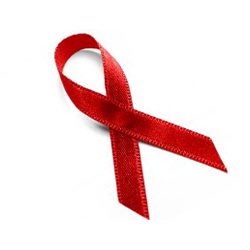Why it’s time to rethink HIV - Public Health Dorset
Changes to Public Health services
Public Health Dorset is no longer a shared service for Dorset and BCP councils. For health and wellbeing information, please visit:
Why it’s time to rethink HIV

It’s World Aids Day. Our head of sexual health, Joanne Wilson, talks about her experiences of working in the field, why we need to rethink our views about HIV and how online testing is the key to diagnosing and treating people early.

World Aids Day aims to reduce the stigma of people living with HIV or Aids.
By Joanne Wilson
As I sit watching X Factor on Saturday night, along with seven million other fans, I am reminded that World Aids Day has arrived with celebrities and contestants decorated with Red Ribbons.
The Red Ribbon started its life in 1991 as a public demonstration of support for those affected by HIV. It was a time when people were living behind closed doors unable to tell friends or family about their HIV status. A symbol of passion, love and the heart, which could easily be replicated (you can even make your own!) and has been by other notable campaigns of different colours.
I recall my own polar experiences of wearing the Red Ribbon. As a youth worker in the late nineties and early noughties, it raised important conversations with young people about sexual health. I explained that wearing it didn’t mean I had HIV, but that it showed my support and gave rise to such opportunities for increasing awareness.
Stigma and discrimination
I also experienced first hand (though mildly) the stigma people living with HIV faced daily. On a typical shopping Saturday in South West London in 2007, while shaking my charity collection box and offering red ribbons. People literally crossed the road. Maybe to avoid donating or perhaps sadly, as one individual vocalised, because ‘I might give him HIV’.
On the 20th anniversary of Freddie Mercury’s death, I can only hope that my personal and professional endeavours and those of my colleagues, family, friends and those brave enough to speak out have eroded the stigma and discrimination exhibited that day. I continue to pin on my Red Ribbon each year. I’m proud of what it stands for and the contribution I believe it undoubtedly has in educating and encouraging people to talk about it and demonstrate we care and support those affected.
Positive developments
There is actually much to be celebrated. There remains only three ways to contract HIV: unprotected sex (95%), sharing needles, and from mother to child. There has been significant progress over the years to limit what was a life threatening illness and support individuals to expect to live a normal life expectancy.
Today 85% of people diagnosed with HIV in the UK are not infectious. Only two per cent of people living with HIV contract through injecting intravenous drugs. And only 0.5% of HIV positive mothers pass on the HIV infection to their baby. We have seen more effective treatments, research into both preventative and therapeutic vaccines, access to PEPSE (Post Exposure Prophylactic after Sexual Exposure to HIV) and trials of PrEP (Pre-Exposure Prophylactic), contributing to improvements to health and wellbeing and reducing transmission.
Important to test
However, there is more to do. It is estimated 18,000 people in the UK are living with HIV and are undiagnosed and 40% of people diagnosed with HIV were diagnosed late, ie after they should have started treatment, having significant consequences for their health and life expectancy.
Why don’t people test? Research suggests lack of awareness, time, worrying about the results and fear of the consequences of a positive result. Add to this media messages which threaten to reverse progress back to the 80s, with shock headlines like ‘Hollywood HIV panic’, following the recent story of Charlie Sheen and disclosure of his HIV status, it is easy to understand why people might chose to avoid a HIV test.
Confidentiality is paramount and the national online testing service provides patients with easy access to testing kits in the privacy of their own home. Kits arrive discretely in the post with everything you need to collect a finger prick blood sample and the post back to the secure laboratory for testing.
You can choose how to receive your results and support is available locally when you need it. Tests are also offered through local sexual health services throughout Dorset, to find your local clinic contact 0300 303 1948 or visit our sexual health pages.
Elton John reminds us HIV will only be overcome by ‘eradicating its most deadly symptom: stigma’.
So this World Aids Day please join me and get involved – challenging people to rethink outdated stereotypes and myths and to know the facts and tell the truth about HIV.
Proudly pin your Red Ribbon on your favourite outfit, not as a fashion accessory, but as a unifying demonstration of awareness, love and support.
Joanne Wilson is head of sexual health programme at Public Health Dorset